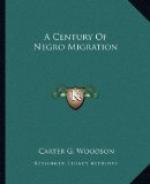In the new commonwealths formed out of western territory, there was the same fear as to Negro domination and consequently there followed the wave of legislation intended in some cases not only to withhold from the Negro settlers the exercise of the rights of citizenship but to discourage and even to prevent them from coming into their territory.[27] The question as to what should be done with the Negro was early an issue in Ohio. It came up in the constitutional convention of 1803, and provoked some discussion, but that body considered it sufficient to settle the matter for the time being by merely leaving the Negroes, Indians and foreigners out of the pale of the newly organized body politic by conveniently incorporating the word white throughout the constitution.[28] It was soon evident, however, that the matter had not been settled, and the legislature of 1804 had to give serious consideration to the immigration of Negroes into that State. It was, therefore, enacted that no Negro or mulatto should remain there permanently, unless he could furnish a certificate of freedom issued by some court, that all Negroes in that commonwealth should be registered before the following June, and that no man should employ a Negro who failed to comply with these conditions. Should one be detected in hiring, harboring or hindering the capture of a fugitive black, he was liable to a fine of $50 and his master could recover pay for the service of his slave to the amount of fifty cents a day.[29]
As this legislature did not meet the demands of those who desired further to discourage Negro immigration, the Legislature of 1807 was induced to enact a law to the effect that no Negro should be permitted to settle in Ohio, unless he could within 20 days give a bond to the amount of $500 for his good behavior and assurance that he would not become a public charge. This measure provided also for raising the fine for concealing a fugitive from $50 to $100, one half of which should go to the person upon the testimony of whom the conviction should be secured.[30] Negro evidence in a case to which a white was a party was declared illegal. In 1830 Negroes were excluded from service in the State militia, in 1831 they were deprived of the privilege of serving on juries, and in 1838 they were denied the right of having their children educated at the expense of the State.[31]
In Indiana the situation was worse than in Ohio. We have already noted above how the settlers in the southern part endeavored to make that a slave State. When that had, after all but being successful, seemed impossible the State enacted laws to prevent or discourage the influx of free Negroes and to restrict the privileges of those already there. In 1824 a stringent law for the return of fugitives was passed.[32] The expulsion of free Negroes was a matter of concern and in 1831 it was provided that unless they could give bond for their behavior and support they could be removed. Otherwise the county overseers could hire out such Negroes to the highest bidder.[33] Negroes were not allowed to attend schools maintained at the public expense, might not give evidence against a white man and could not intermarry with white persons. They might, however, serve as witnesses against Negroes.[34]




